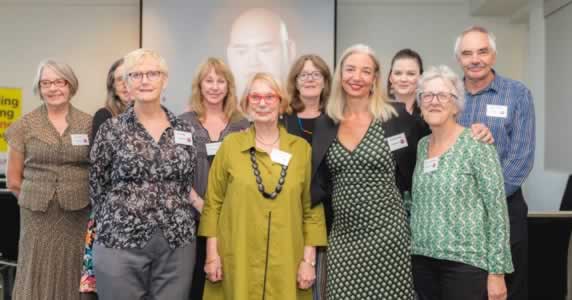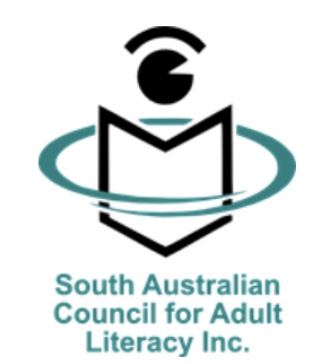May 2019
In this issue
1. From the Co-Presidents
2. ACAL response to ASQA
3. What's happened to PIAAC?
4. 'Critical Re-imagining' 2019 ACAL Conference
-
Call For Abstracts - Closes 31 May 2019
-
Here's a poster calling for presenters and papers.
5. Conversation starter - health literacy provision
6. Have you read it?
7. 'Empowerment' or 'compliance'
8. New research - regional and remote VET
9. Thank you Rhonda Pelletier
10. The Reading Writing Hotline 25th Anniversary Celebration
11. Rewiring the Brain QCAL event
12. SACAL 2019 State conference - call for papers
13. ACAL Membership is now over overdue
1. From the Co-Presidents
Planning for the annual ACAL conference is well underway and calls for presentations, papers and early registrations are open. We are looking forward to the Sydney event 3-5 Oct and hope to see many of you there.
During the past month people across the country have been dissecting the Joyce VET review and we found ourselves pulling out the literacy sections and wondering what they will mean, if anything, for the future of adult literacy in Australia. At first glance there was a pleasing focus on literacy, with proposals that all Australians who need LLND (Language, Literacy, Numeracy, Digital) skills for work will be able to 'gain them'. However, what this means in terms of who is identified as needing skills (eligibility), what LLND for work skills are defined as, and who will be expected to 'give' the skills to those in need remains to be seen.
Discussion around the coupling of L + LN + D has also begun. It seems not that long ago that we were debating whether to pull apart L + N. This was followed by the merging of L + LN, which is still having repercussions (see for example this month's Have you read article), and now we have the addition of D. As one committee member recently pointed out, multiple literacies includes digital literacy anyway! We hope that the emphasis on D retains a digital literacy focus and does not detract or redirect funding from other literacy provision.
On reflection, the issues that remain critical are leadership and maintaining expertise in the field of adult literacy and numeracy education, maintaining access, equity and quality of literacy and numeracy provision and the wider interpretation and value of what it means to be literate and numerate in Australia today.
Daniella Mayer and Jo Medlin, Co-Presidents
2. ACAL response to ASQA
This month ASQA's Industry and Risk Intelligence section invited ACAL to provide information on current concerns impacting the training and assessment sector. ACAL responded, raising three areas of concern:
-
Impacts of the TAE LLN units
-
Reduced access to qualified literacy and numeracy specialists
-
Trainer and assessor qualifications required by the Foundation Skills Training Package (FSK)
3. What's happened to PIAAC?
On 21.2.2019 Senator Doug Cameron put the following questions to the Department of Education and Training in the Senate's estimates committee:
-
What level of funding has been allocated to undertake the PIACC survey?
-
Is the PIACC survey going to be designed and administered by the ABS?
-
What is the procurement process for the PIACC and what are the associated timelines?
-
Has any additional funding been allocated to specifically sample ATSI communities?
4. 'Critical Re-imagining' 2019 ACAL Conference

Call For Abstracts - Closes 31 May 2019
ACAL invites submissions of abstracts for consideration for inclusion in the 2019 ACAL conference e-programme. This year ACAL is inviting proposals for presentations in two categories:
-
the usual type of presentations, which may be a workshop, activity or non-refereed paper presentations , and
-
peer reviewed academic paper presentations for which additional requirements apply.
Abstracts are invited for presentations and workshops on topics including but not limited to:
-
Literacy and numeracy for sustainable development
-
Literacy and numeracy for community development
-
Embedding literacy and numeracy in vocational and workplace training
-
Academic literacy and numeracy for tertiary education pathways
-
Working with early school leavers and young adults
-
Teaching and learning in corrective services
-
Working with VET products – e.g. the Australian Core Skills Framework, Core skills for Work, the Foundation Skills Training Package
-
Models for developing the adult literacy and numeracy workforce – initial teacher training, continuing professional development
-
Employment and career challenges and opportunities in adult literacy and numeracy
-
Researching everyday adult literacy and numeracy practices
 Here's a poster calling for presenters and papers.
Here's a poster calling for presenters and papers.
Please distribute the poster to your workplace and other networks – electronically or printed.
Conference Fees
Member |
Non-member |
|
1 day |
$315 ($265 early) |
$340 ($290 early) |
2 day |
$580 ($480 early) |
$630 ($530 early) |
Discounts for speakers |
Early bird - book before 4 August 2019
Pre-Conference Workshop $100, after August 4, $110
5. Conversation starter - health literacy provision
 The papers are the views and perspectives of the author and the ACAL committee encourages you to read and use this as both a means of professional development as well as an opportunity to start conversations.
The papers are the views and perspectives of the author and the ACAL committee encourages you to read and use this as both a means of professional development as well as an opportunity to start conversations.
Health literacy provision: Can health and adult literacy workers collaborate effectively in this increasingly important space?
by Ann Kelly May 2019
As the average age of citizens has increased and diseases, such as diabetes, have become prevalent among many populations, governments and other stakeholders have committed to improving the ability of people to take control of their own health and, simultaneously, lessen the increasing national economic burden that is an outcome of this situation.
In this Conversation Starter, first, I consider continuing attempts by the United States (US) to identify people with health literacy needs. Next, I consider the Australian Government’s position on health literacy and suggested strategies to meet this need. Third, I note examples of collaborative action by health and adult literacy workers in both the US and Australia and, finally, I reflect on the viability of such collaborations in the present training climate.
6. Have you read it?
A review of documents relating to adult literacy and numeracy by Jo Medlin
This month Jo Medlin has reviewed ACTA's online submission to the Evaluation of the Adult Migrant English Program (AMEP) new business model. The submission (in two parts) forms the ACTA response to the evaluation being carried out by Social Compass, a consultancy company who have been engaged by the Department of Education and Training.
7. 'Empowerment' or 'compliance'
'Adult literacy and liberal-progressive pedagogy: Australian contexts', by Steven Black and Barbara Bee. Research in Post-compulsory Education, 23(2), 181–201.
In this article, the two authors contrast the two key adult literacy discourses of 'empowerment' and 'compliance' and their related policy and practice that were a feature of what he calls the 'socio-democratic' era from the end of the 1970s through the 1980s and following this period up to the present, the 'neoliberal era' of the 1990s. They claim that, currently, there are 'few spaces' in which 'empowerment' of learners and other stakeholders can be enacted.
8. New research - regional and remote VET
In August 2018 Community Colleges Australia sponsored a research study investigating the 'Provision of foundation programs by community education providers in regional and remote Australia and their implications for VET'.
The study is led by Lisel O'Dwyer and John Stanwich of NCVER.
The research report is due in November this year.
9. Thank you Rhonda Pelletier
This month we say a special thank you to Victorian ACAL state representative, Rhonda Pelletier. State representatives are volunteers who undertake a significant double role in being state council committee members as well as ACAL committee members. Rhonda has represented Victoria with ACAL since 2015 and recently wrote a thoughtful, well researched conversation starter about the deficit approach that enlightened many of us and contributed to ongoing national conversations about the way literacy is perceived and approached. Thank you Rhonda, we will miss your knowledgeable input very much.
Rhonda is continuing her valuable work in the field by moving into the role of secretary for VALBEC and we welcome Kerrie Tomkins as the new state rep for Victoria.
10. The Reading Writing Hotline 25th Anniversary Celebration

 The Hotline offers important information and advice on available literacy courses and literacy qualifications nationally. TAFE NSW manages this well-respected service with funding provided by the federal Department of Education.
The Hotline offers important information and advice on available literacy courses and literacy qualifications nationally. TAFE NSW manages this well-respected service with funding provided by the federal Department of Education.
Vanessa Iles current manager of the Hotline compered the event. The main speakers were: Lyn Wilson Team Leader Literacy TAFE NSW, David Riordan Director of City Operations City of Sydney and Don Perlgut the CEO of Community Colleges Australia. Lyn has worked in the literacy field for many years and is the proud recipient of the 2015 Excellence in Language, Literacy and Numeracy Practice Award, Australian Training Awards. Both Don and David possess an historical connection with the Hotline.
11. Rewiring the Brain QCAL event
 QCAL Free PD event: Rewiring the Brain program overview, Thursday, 30 May, 5-6.30 pm. West End Croquet Club.
QCAL Free PD event: Rewiring the Brain program overview, Thursday, 30 May, 5-6.30 pm. West End Croquet Club.
Rewire the Brain (RTB) is a training program based on the exciting new research on neuroplasticity: the concept that we can change our brains at any stage of life. The program aims to improve cognitive function, social and emotional skills, and capacity for self-regulation in young people aged 16-24 who have moved or are at risk of moving away from education and into long-term unemployment.
12. SACAL 2019 State conference - call for papers
 'More than the Classroom'
'More than the Classroom'
Friday, 16 August 2019 - TAFE SA, Regency Park Campus 9am to 4.30pm
The South Australian Council for Adult Literacy, Inc. invites submissions from interested parties to present at our 2019 conference with the theme of More than the Classroom: exploring and demystifying what influences the learning experience.
Submissions from individuals and teams working and learning in all areas of adult education are welcome.
13. ACAL Membership is now over overdue
Thanks to those who have already renewed.
